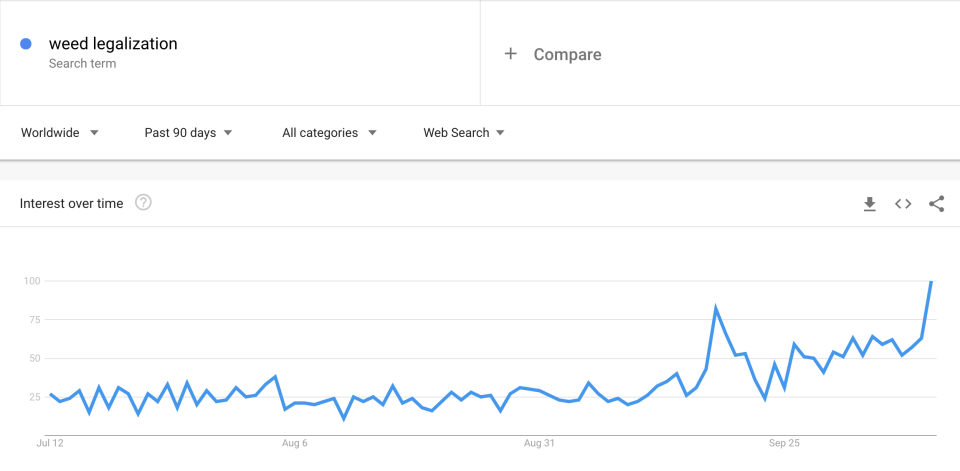Cannabis edibles will soon be a $4 billion business

The cannabis business is on fire lately, and one area in the space could have serious potential to heat up: edibles.
According to new research by Arcview Market Research, spending on edibles in the U.S. alone topped $1 billion last year. With just days left before Canada legalizes the recreational use of marijuana, Arcview estimates that number could reach $4.1 billion by 2022 for the two nations.
“The edibles market is up for grabs. We’re already seeing mainstream beverage companies scrambling to take advantage of part of this significant opportunity,” the report stated.
Two months ago, Constellation Brands (STZ) upped its stake in Canadian cannabis company, Canopy Growth (CGC), to nearly 10%. In September, beverage giant Coca-Cola (KO) expressed interest in a potential partnership with Aurora Cannabis (ACBFF) to develop weed-infused drinks. And alcohol maker Molson-Coors (TAP) also announced that its Canadian unit will be working to develop CBD-infused beverages.
“And when you consider that the investments made so far by these beverage companies, touches primarily the beverages sub category, then you start to get a sense of the magnitude of the overall edibles market,” according to Arcview.
The cannabis craze
Cannabis has clearly captivated Wall Street. Tilray (TLRY), a US publicly-traded Canadian cannabis company, has had a meteoric rise since its IPO in July. Shares are up more than 800% from its IPO price of $17 per share. Earlier this week, top cannabis analyst Vivien Azer reiterated her Outperform rating on Tilray and nearly tripled her 12-month price target to $172 per share from $62 — about a 10% move higher from Monday’s opening price.
“Our broader, big picture view of cannabis goes beyond the adult-use launch in Canada on October 17. Rather, we believe this is the first step toward the establishment of cannabis as a key functional ingredient touching multiple consumer categories with four key verticals: adult use, beauty and nutraceuticals, OTC pain and sleep, and pharmaceuticals,” Azer said in a note to clients.
And it’s not just Wall Street jumping on the bandwagon. According to Google Trends, over the past 90 days, “weed legalization” searches worldwide have spiked, with most searches coming from Canada.

Global strategy and management consulting firm A.T. Kearney recently surveyed 1,000 U.S. consumers and 1,000 Canadian consumers from various backgrounds who were aware of the term “cannabis.”
They found that “more than half of the U.S. and Canadian respondents would try recreational cannabis if or when it becomes legal, mostly in smoking (39%), food (41%), and edible (28%) forms.” Food includes candy, chocolate snacks and packaged foods, and edible forms including capsules, soft gels and powders.
Despite the public’s willingness to consume such edibles, some U.S. states are looking to ban certain types, specifically candies, chocolates and fruit chews that could be mistaken for candy by children.
Washington, which legalized recreational marijuana in 2012, announced last week that it might ban edibles that could be accidentally ingested by children. According to the Washington State Liquor and Cannabis Board, cannabis-infused edibles were approximately 9% of the marijuana products sold in the state. The board stated that other types of edibles would still be for sale.
However in Colorado, “Edibles outpaced the overall cannabis growth rate, increasing at a compound annual growth rate of 35% between 2014 and 2018,” according to Arcview. “The trends we see in Colorado are not unique. Consumers in other U.S. states are also purchasing products higher up in the value chain, notably concentrates and edibles.”
This story has been updated to correctly reflect that Coca-Cola was interested in a potential partnership with Aurora Cannabis.
Heidi Chung is a reporter for Yahoo Finance. Follow her on Twitter @heidi_chung.
More from Heidi:
Market volatility is normal in October
Walmart and PayPal team up to allow customers to access cash at stores

 Yahoo Finance
Yahoo Finance 
